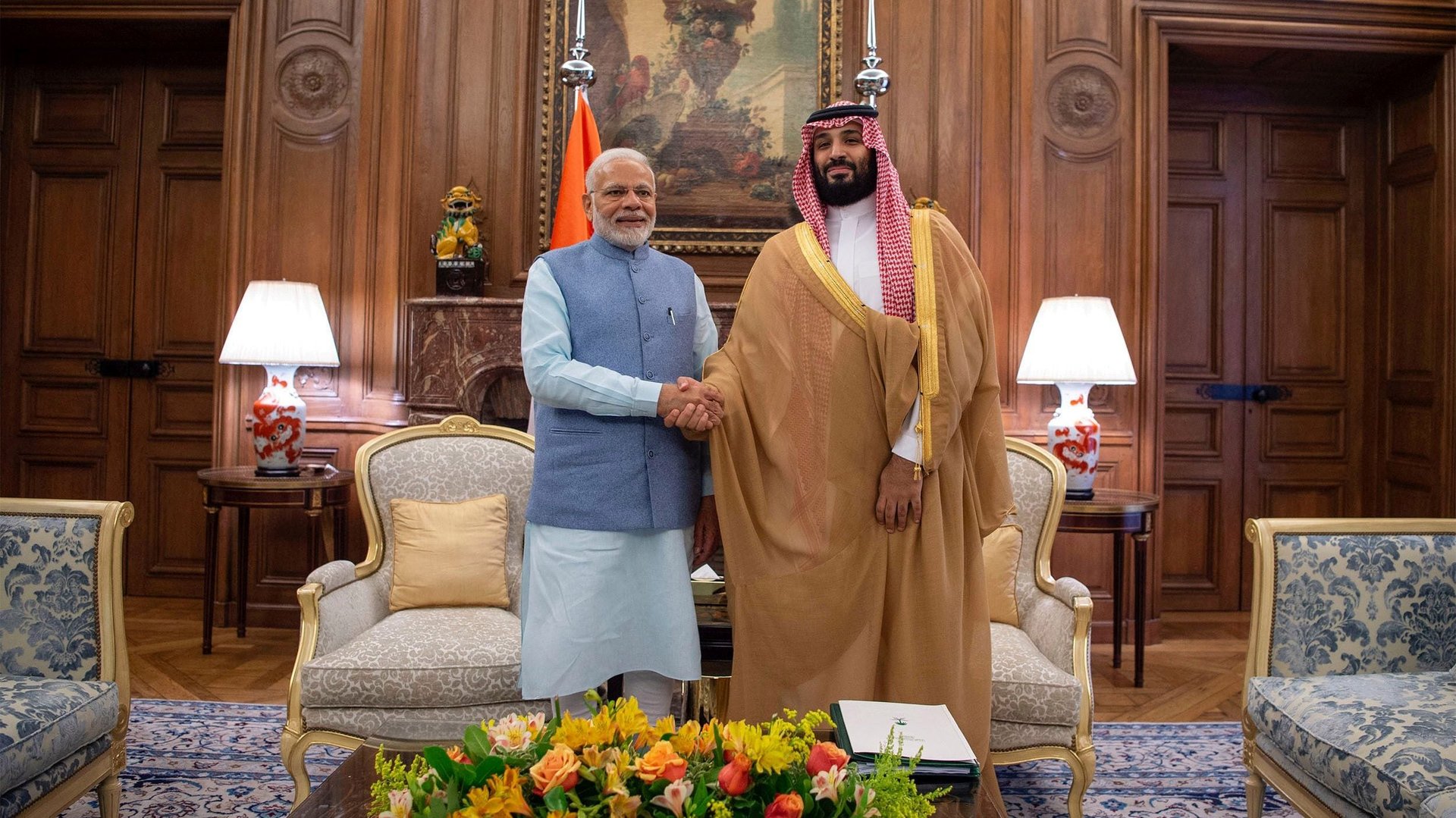The Saudi crown prince is walking a tightrope across Pakistan and India
The Saudi Arabian crown prince’s visit to India today (Feb. 19) will be a tough balancing act, both for him and his hosts.


The Saudi Arabian crown prince’s visit to India today (Feb. 19) will be a tough balancing act, both for him and his hosts.
Prince Mohammed bin Salman comes hours after having spent two glitzy days in Pakistan, India’s arch rival, right at a time when relations between the nuclear-armed neighbours have hit a disconcerting low.
India reportedly even made his plane return briefly from Islamabad back to Riyadh, to ensure that he isn’t seen arriving in New Delhi straight from Pakistan.
In the deadliest attack on security forces in the Indian state of Jammu & Kashmir in years, a suicide bomber rammed an explosive-laden SUV into a convoy of the Central Reserve Police Force (CRPF) last week, killing at least 40 uniformed men.
Pakistan-based extremist group Jaish-e-Mohammed (JeM) claimed responsibility for the bombing. India has accused the Pakistani state of having a “direct hand” in the attack, and vowed retribution.
Like several Asian countries, Saudi Arabia too has issued a general condemnation of the Pulwama attack, but India will be looking for a stronger reaction during the crown prince’s stay. However, if his much-hyped visit to Islamabad was any indication, this may not be easy to come by.
For starters, there is the prickly issue of JeM founder Masood Azhar. In a joint statement at the end of the visit, Saudi Arabia and Pakistan “underlined the need for avoiding politicization of UN listing regime.” This undermines India’s attempts to include Azhar, based in Pakistan, on the UN’s list of designated terrorists.
Saudi Arabia is a traditional Pakistan ally, their relationship underpinned by both religion and a historic closeness to the US since the Cold War. The Pakistan Army protects the royal family, and the Saudi government often helps Pakistan’s struggling economy with money and cheap oil.
Through the past two days, both Pakistani officials and the crown prince, who more or less runs the kingdom as the 83-year-old Saudi king has taken a step back from public life, seemed eager to demonstrate these close ties.
The hosts released a video of fighter jets escorting the prince’s plane in their national airspace; prime minister Imran Khan broke protocol to receive and personally drive him to his residence.
On his part, bin Salman, who was expected to announce investments of up to $15 billion (over Rs1 lakh crore) in Pakistan, ended up allocating $20 billion. It would be an amount, he proclaimed, that “will grow every month, every year in bigger numbers.”
However, New Delhi’s bond with the kingdom has bloomed along another dimension: trade.
Oil, Iran, and Khashoggi
India is the third biggest importer of Saudi oil, demand for which is only growing despite the Indian government’s efforts to reduce the country’s import bill.
Like Pakistan, India has courted investment from the west Asian kingdom. Indians have also been battered by a steep rise in fuel prices. With elections due by May, prime minister Narendra Modi has been lobbying the Organization of the Petroleum Exporting Countries (OPEC) for a price cut, and Saudi Arabia is the cartel’s pre-eminent member.
Meanwhile, bin Salman is in urgent need for international validation. Western allies have shunned him following the murder of journalist Jamal Khashoggi, allegedly at his behest, at the Saudi consulate in Turkey last October.
Modi had met the crown prince at the G20 summit only a month after Khashoggi’s killing, when no world leader was willing to be photographed with the 33-year-old. India has also remained silent amid mounting international criticism of the kingdom’s devastating war in Yemen, another of bin Salman’s pet projects.
Iran is the other thorn in the flesh for New Delhi’s relationship with Riyadh. Despite US sanctions, India has continued buying oil from Saudi Arabia’s bitter enemy. It has also invested in the Chabahar port, just a few score miles west of Pakistan’s Gwadar port, in which China has poured money under the Belt and Road Initiative. Both Gwadar and Chabahar are of strategic importance.
Bin Salman’s new investment package for Pakistan also includes $8 billion for an oil refinery in Gwadar.
“We can’t say no to Pakistan,” he had said in Khan’s company on Feb. 18. The next two days may well reveal whether he can say no to India.